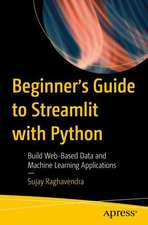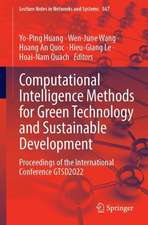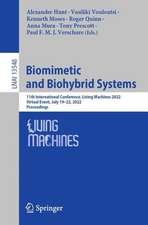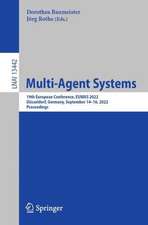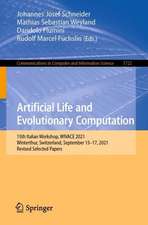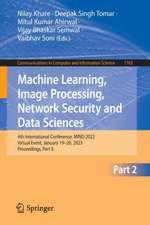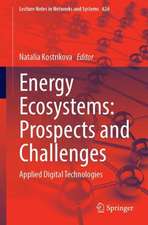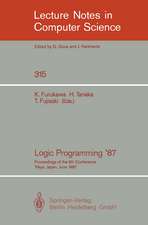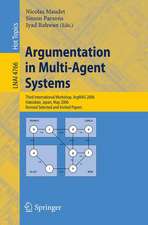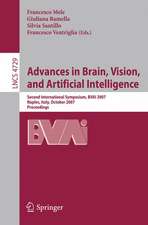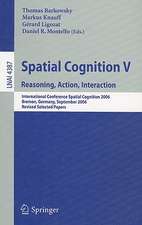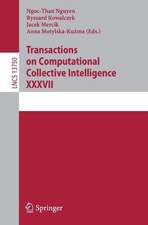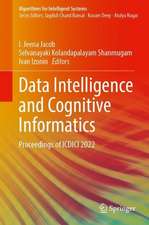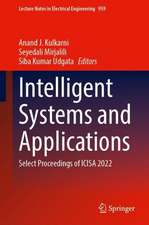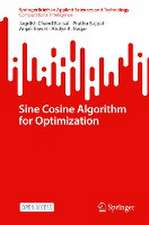Engineering Applications of Social Welfare Functions: Generic Framework of Dynamic Resource Allocation: Automation, Collaboration, & E-Services, cartea 13
Autor Francisco Munoz, Ashutosh Nayak, Seokcheon Leeen Limba Engleză Paperback – 18 noi 2023
| Toate formatele și edițiile | Preț | Express |
|---|---|---|
| Paperback (1) | 977.74 lei 6-8 săpt. | |
| Springer International Publishing – 18 noi 2023 | 977.74 lei 6-8 săpt. | |
| Hardback (1) | 983.85 lei 6-8 săpt. | |
| Springer International Publishing – 18 noi 2022 | 983.85 lei 6-8 săpt. |
Preț: 977.74 lei
Preț vechi: 1222.18 lei
-20% Nou
Puncte Express: 1467
Preț estimativ în valută:
187.12€ • 194.63$ • 154.47£
187.12€ • 194.63$ • 154.47£
Carte tipărită la comandă
Livrare economică 15-29 aprilie
Preluare comenzi: 021 569.72.76
Specificații
ISBN-13: 9783031205477
ISBN-10: 3031205472
Pagini: 94
Ilustrații: XI, 94 p. 50 illus., 21 illus. in color.
Dimensiuni: 155 x 235 mm
Greutate: 0.16 kg
Ediția:1st ed. 2023
Editura: Springer International Publishing
Colecția Springer
Seria Automation, Collaboration, & E-Services
Locul publicării:Cham, Switzerland
ISBN-10: 3031205472
Pagini: 94
Ilustrații: XI, 94 p. 50 illus., 21 illus. in color.
Dimensiuni: 155 x 235 mm
Greutate: 0.16 kg
Ediția:1st ed. 2023
Editura: Springer International Publishing
Colecția Springer
Seria Automation, Collaboration, & E-Services
Locul publicării:Cham, Switzerland
Cuprins
Introduction to Engineering Applications of Social Welfare.- Routing in Wireless Sensor Networks – Energy Welfare.- Ambulance Dispatching – Preparedness Welfare.- Group Decision Making in Intelligent Shared Environments – Preference Welfare.- Task Allocation in Multi-Robot Systems – Resource Welfare.- Resource Sharing in Cyber-Physical Systems – Utility Welfare.- Conclusion, Limitations, and Research Opportunities.
Textul de pe ultima copertă
This book presents social welfare functions as a unified multidisciplinary framework for various resource allocation problems. By measuring the impact of local decisions on broader society, social welfare functions enable “socialized” decisions and thereby produce an emergent property that “global” balance and welfare emerge from “local” welfare-maximizing behaviors. Social welfare functions are originally used in economics to quantify income welfare, jointly considering average and inequality to arrive at better measures of welfare than average alone. Wishing the readers to find opportunities for their problems of interest, this book introduces research results of social welfare functions applied in five different engineering applications, defining welfare metrics pertaining to the characteristics of the application. The “energy welfare” in wireless sensor network measures richness of distributed sensors in energy. The “preparedness welfare” in emergency medical services quantifies the preparedness level of an entire service area by aggregating preparedness levels of individual zones. The “preference welfare” in intelligent shared environments represents the opinions of real people for groups. The “resource welfare” in multi-robot task allocation quantifies the efficiency of utilizing distributed resources across robots. The “utility welfare” in complex cyber-physical systems quantifies the impact of local resource sharing decisions on the broader task communities.
Caracteristici
Presents a unified principle and framework for various dynamic resource allocation problems Introduces a multidisciplinary approach applying social welfare from economics to engineering Synthesizes perspectives and directions from both economists and engineers















